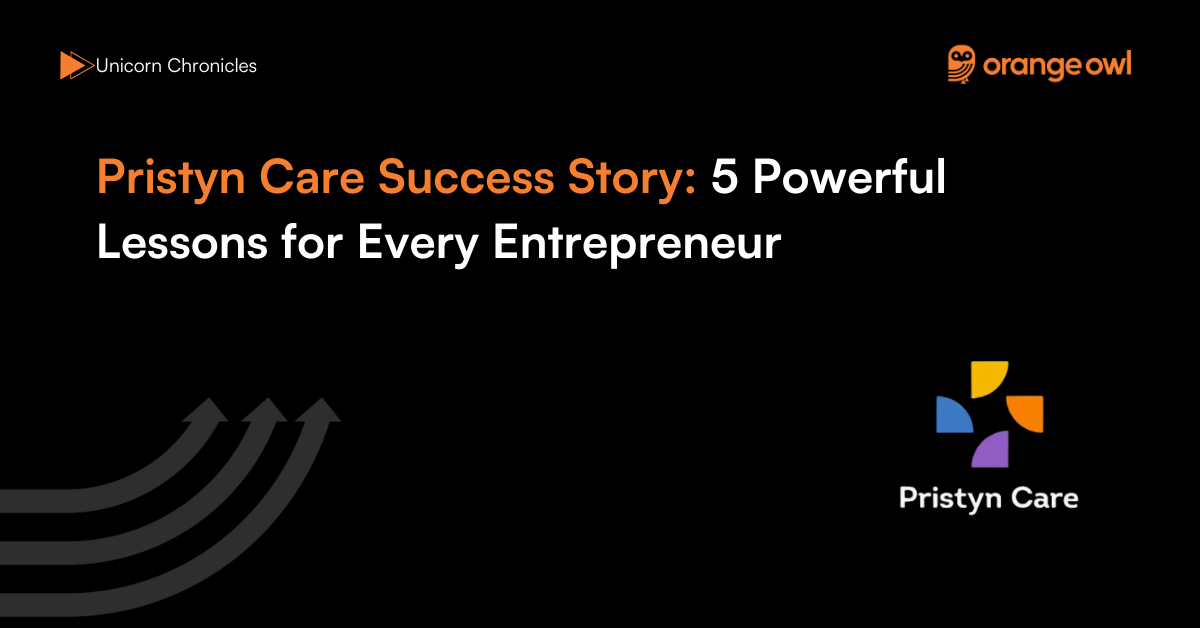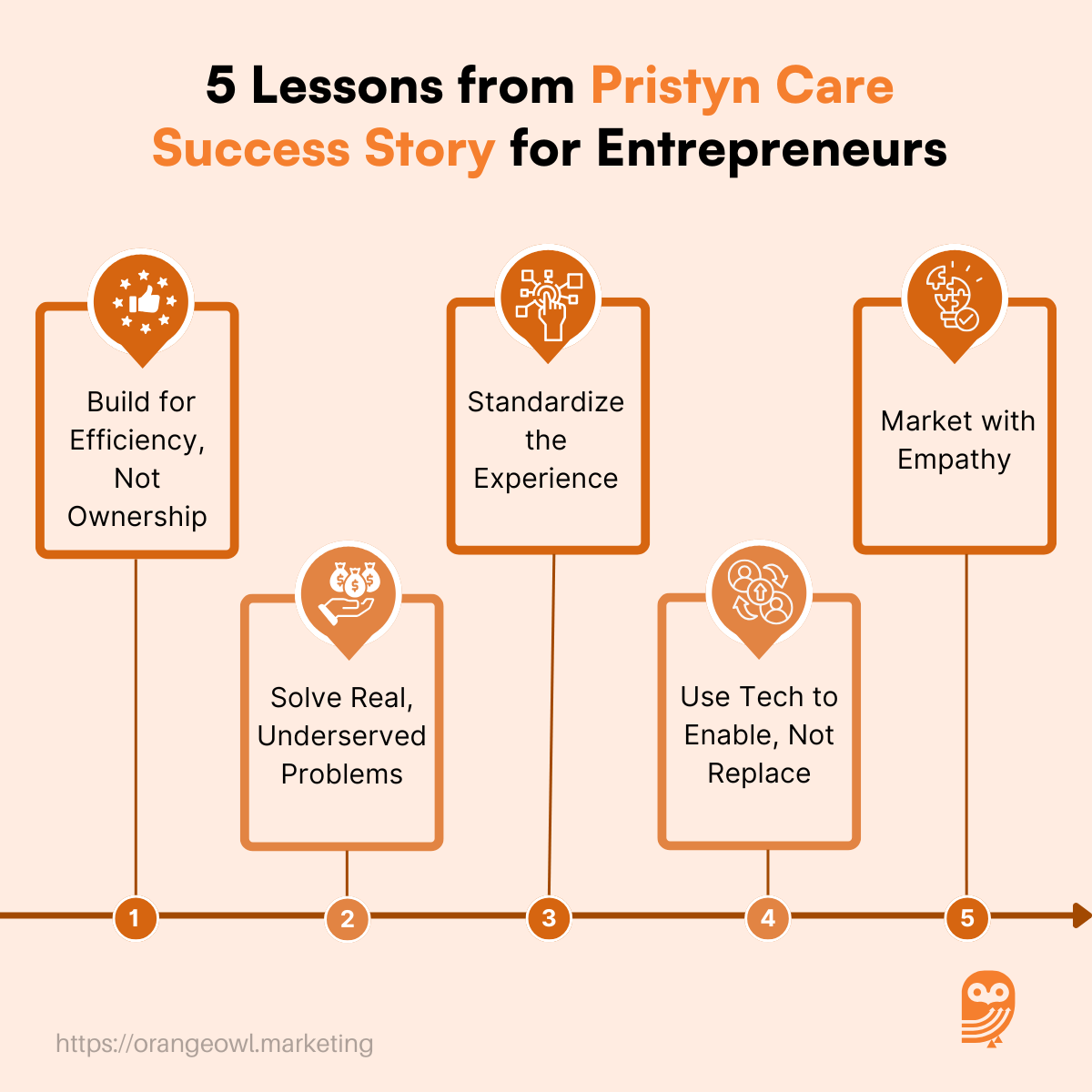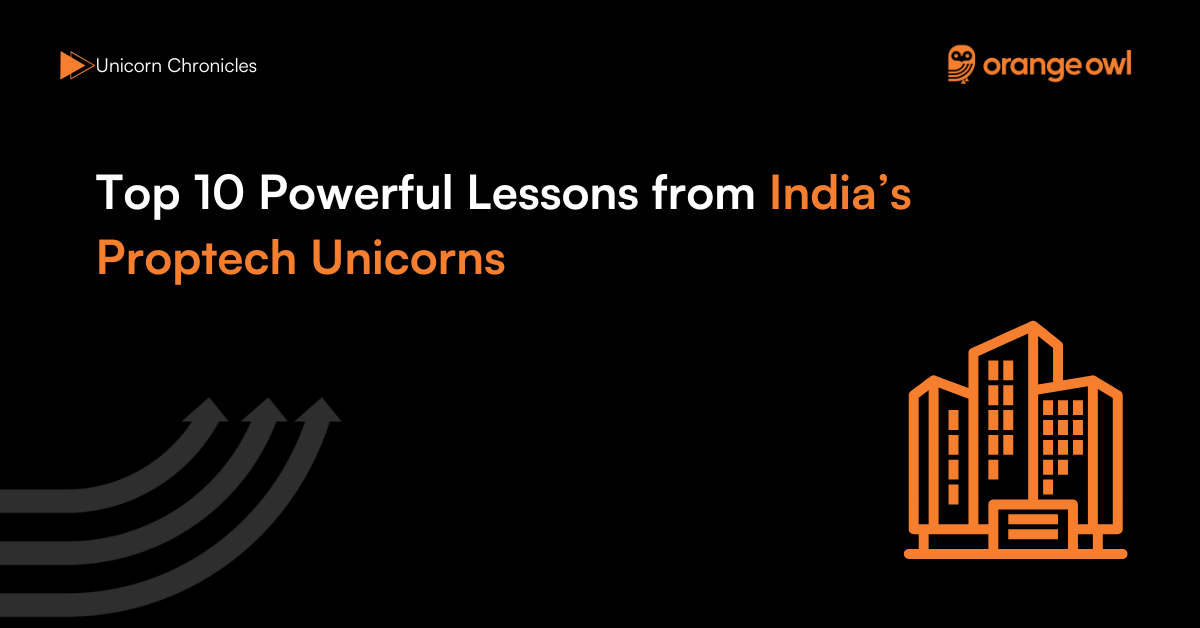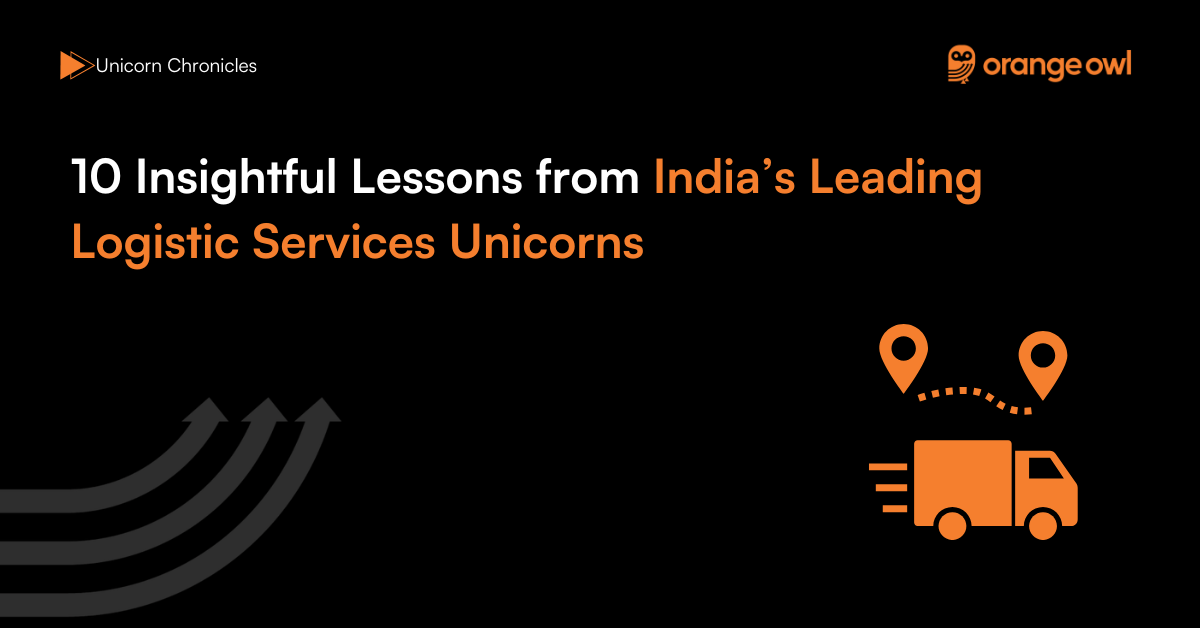Pristyn Care Success Story: 5 Powerful Lessons for Every Entrepreneur
Vivek Goel
June 10, 2025

Table of Contents
Introduction
In the ever-evolving world of healthtech, few companies have managed to disrupt the traditional care delivery model as effectively as Pristyn Care. With an asset-light model, doctor-led care delivery, and a technology-first approach, the startup has revolutionized how elective surgeries are accessed and experienced in India. What started in 2018 as a bold experiment to streamline surgical care has now become one of the country’s fastest-growing healthtech platforms.
Today, Pristyn Care operates in 40+ cities, has a team of over 400+ surgeons, and has partnered with more than 1,000 hospitals across the country to simplify and standardize surgical procedures. As of 2024, the company has performed over 2 million surgeries and facilitated more than 10 million patient interactions, serving as a testament to its massive operational scale and patient-first approach.
Pristyn Care’s success is also reflected in its strong investor backing. It has raised over $177 million in funding, with marquee investors such as Sequoia Capital India, Tiger Global, and Winter Capital on board. In December 2021, the startup entered the coveted unicorn club with a valuation of $1.4 billion, becoming one of India’s few healthtech unicorns.
What sets Pristyn Care apart is not just its rapid growth but also its clarity of vision and flawless execution. From solving fragmented hospital experiences to ensuring doorstep patient support and post-op care, the company has redefined convenience in elective healthcare.
As Dr. Garima Sawhney, co-founder and gynecologist at Pristyn Care, said in a recent interview:
“We didn’t want to create a hospital. We wanted to solve the broken experience of elective surgeries in India. People were struggling with unclear pricing, long waiting times, and lack of post-surgery care. We wanted to remove that pain from the patient’s journey.”
With a laser focus on patient empathy, operational efficiency, and smart use of technology, Pristyn Care is not just growing—it’s setting new benchmarks for healthcare delivery in India.
Origin Story
Pristyn Care was founded in 2018 by Dr. Garima Sawhney, Dr. Vaibhav Kapoor, and Harsimarbir Singh—a trio driven by a shared mission to overhaul India’s fragmented elective surgery space. Both Dr. Garima and Dr. Vaibhav, being trained surgeons, had spent years working within the traditional hospital ecosystem.
They witnessed firsthand the chaos and confusion patients endured—inconsistent pricing, unclean facilities, long waiting times, and no post-operative accountability. These were not isolated problems but systemic issues that patients in Tier 1 and Tier 2 cities were routinely grappling with.
Meanwhile, Harsimarbir Singh, with his engineering background and product leadership experience at companies like UrbanClap (now Urban Company) and MobiKwik, brought a complementary perspective to the table. He understood what it took to build consumer-facing platforms and scalable tech solutions.
This cross-functional synergy laid the foundation for what Pristyn Care would ultimately become: a tech-enabled platform that handles the entire surgical journey—from diagnosis to discharge to recovery.
Their vision was bold yet clear—to make surgeries simple, safe, and patient-centric by partnering with hospitals for infrastructure, hiring top doctors, and standardizing care protocols using technology. They aimed to take ownership of the patient experience without owning physical hospitals—an asset-light model inspired by the likes of Uber and OYO, but tailored for the healthcare sector.
As Dr. Vaibhav Kapoor explained:
“We believed elective surgeries shouldn’t be so difficult to navigate. Patients deserve better transparency, better outcomes, and a more humane experience. That’s what we wanted to fix.”
Business Landscape and Early Challenges
When Pristyn Care entered the Indian healthcare market in 2018, it was stepping into a space riddled with legacy problems. India’s $4 billion elective surgery market was dominated by unorganized players. Most hospitals were either overburdened, understaffed, or simply not focused on customer experience. Even premium hospitals often lacked digitization and operational transparency.
Pristyn’s team identified a clear gap: while patients wanted quality surgical care, they didn’t want to go through the ordeal of managing insurance paperwork, coordinating with multiple departments, or worrying about hygiene and follow-ups. This is where Pristyn positioned itself—not as a hospital but as an orchestrator of care, offering a 360° surgery experience.
However, execution was far from easy. In the beginning, hospital partners were skeptical. Most were unwilling to collaborate with a startup that wanted to impose standard operating procedures (SOPs), branding, and digital workflows. The founders had to prove themselves—by driving real patient footfall, improving occupancy rates for underutilized hospital infrastructure, and maintaining clinical quality.
As Harsimarbir Singh mentioned, “Hospitals didn’t trust us initially. We had to show value before asking for partnerships.” The company also had to invest heavily in building tech for doctors, operations, logistics, and customer support.
Growth Strategies
One of the most impactful growth decisions Pristyn Care made early on was to adopt an asset-light model. Instead of investing in real estate or building new hospitals from the ground up, the company chose to partner with existing hospitals and surgical centers across India. This approach allowed them to scale rapidly without the burden of infrastructure costs, enabling expansion to 40+ cities and partnerships with 1,000+ hospitals by 2024.
In tandem, the company built a dedicated team of 400+ in-house surgeons, a move that helped them maintain control over the quality of care. These doctors adhered to standard operating protocols (SOPs) developed in-house, ensuring consistency, safety, and reliability regardless of the hospital or city. This created a branded surgical experience—a rarity in India’s fragmented healthcare landscape.
What truly differentiated Pristyn Care was their end-to-end patient service model. From free cab pickup and drop-off, insurance documentation assistance, and cashless facilities to dedicated care coordinators and post-op consultations, the platform removed all friction from the patient journey. This high-touch model turned an often stressful surgical experience into one that was predictable, smooth, and trustworthy.
Additionally, the company invested heavily in technology infrastructure. They developed internal digital tools to manage everything—from surgeon workflows and patient EMRs to hospital coordination and real-time tracking of surgical procedures. This not only improved operational efficiency but also enabled better data-driven decision-making, leading to higher patient satisfaction and improved clinical outcomes.
Marketing Strategies
From the beginning, Pristyn Care understood that healthcare is not just about science—it’s also about emotion and trust. The company’s marketing strategy focused on communicating simplicity, empathy, and assurance. Their core positioning—“Surgery Simplified”—was more than a tagline; it was a promise to ease every step of the patient’s journey.
They executed a sharp performance marketing strategy, investing heavily in Google Search ads to capture high-intent users searching for specific surgeries or symptoms. They also used regional language content and localized ad campaigns to reach patients in Tier 2 and Tier 3 cities, where the awareness and access gap was even wider.
A key pillar of their marketing success was digital credibility. The company published patient testimonials, recovery videos, and case stories on social media and YouTube, which helped demystify surgical procedures and reduce fear. They also ran SEO-driven blogs and educational content around common surgeries, establishing themselves as a trusted knowledge source.
Pristyn Care further amplified its brand by leveraging founder-led storytelling. In various podcasts and interviews—including the Founders Unfiltered podcast—Harsimarbir Singh emphasized the company’s human-first approach:
“We’re not just about surgeries. We’re about making healthcare human again.”
The result? A brand that didn’t just speak in clinical terms, but resonated emotionally—earning trust, especially in a market where healthcare is often met with skepticism.
5 Growth Lessons Every Entrepreneur Should Learn from Pristyn Care
1. Build for Efficiency, Not Ownership
Pristyn Care’s asset-light model is a masterclass in operational efficiency. By leveraging partnerships with existing hospitals instead of owning or building infrastructure, the company minimized capital investment while maximizing reach.
This strategy enabled them to scale to 40+ cities and 1,000+ hospital partnerships within just a few years. For entrepreneurs, the lesson is clear: owning assets isn’t always the fastest or smartest path to growth. Sometimes, creating a strong ecosystem of partners is more sustainable and capital-efficient.
2. Solve Real, Underserved Problems
Elective surgery isn’t a glamorous sector. It’s complex, heavily regulated, and filled with inefficiencies. But that’s exactly why Pristyn Care thrived. The founders zeroed in on a real, painful problem—the broken experience surrounding surgical procedures—and fixed it with empathy and precision.
Entrepreneurs often chase trendy industries, but some of the most valuable opportunities lie in underserved or overlooked sectors. Solving these critical yet neglected problems can create long-lasting impact and meaningful value.

3. Standardize the Experience
Scaling a healthcare business without compromising on quality is no easy feat. Pristyn Care achieved this by enforcing standard operating procedures (SOPs) across every touchpoint—from diagnostics and doctor consultations to surgery and post-op care.
They even standardized non-medical aspects like cab pickups, insurance paperwork, and follow-up communication. This created a uniform and reliable experience across all cities and hospitals. For entrepreneurs, the message is this: process is power. If you want to scale, you must codify what works and replicate it consistently.
4. Use Tech to Enable, Not Replace
Unlike many healthtech startups that try to automate everything, Pristyn Care took a tech-enabled, human-first approach. Their technology empowered doctors and care coordinators—not replaced them.
From surgery scheduling systems to real-time patient tracking and internal workflow automation, their tech stack enhanced efficiency without compromising empathy. Entrepreneurs should take note: technology should enhance human capabilities, not diminish them. In high-touch sectors, human connection still drives trust and retention.
5. Market with Empathy
In healthcare, trust is everything. Pristyn Care didn’t just promote surgeries—they reassured patients, educated families, and simplified fears. Their marketing combined intent-based digital ads, emotional video content, and founder storytelling to create a brand that felt personal and reliable.
Their message—“Surgery Simplified”—resonated deeply because it addressed patient pain points, not just features. The takeaway for entrepreneurs: emotion sells. Understand your customer’s context, speak their language, and build trust before you pitch.
Conclusion: Key Takeaways from Pristyn Care’s Journey
Pristyn Care’s journey is a blueprint for modern entrepreneurial success—where speed meets strategy, and technology meets empathy. The company’s rise in just a few short years proves that solving a real problem with relentless focus and operational discipline can create transformative change. By choosing to partner instead of build, standardize instead of improvise, and empower rather than replace, Pristyn Care revolutionized how elective surgeries are delivered in India.
Their story is also a reminder that innovation isn’t always about new inventions—it’s often about improving what already exists. By streamlining fragmented processes and putting the patient at the center, they not only disrupted a traditional industry but also built a lasting brand.
As co-founder Harsimarbir Singh eloquently put it:
“It’s not about doing everything—it’s about doing the right things with intensity, speed, and empathy.”
For entrepreneurs, the Pristyn Care playbook offers five core principles: focus on the user, scale through smart systems, leverage partnerships, empower with tech, and market with heart. These aren’t just business strategies—they’re universal growth truths.


